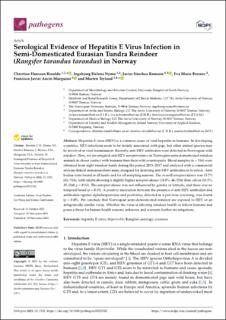Serological evidence of hepatitis e virus infection in semi-domesticated eurasian tundra reindeer (Rangifer tarandus tarandus) in norway
Rinaldo, Christine Hanssen; Nymo, Ingebjørg Helena; Sanchez Romano, Javier; Breines, Eva Marie; Murguzur, Francisco Javier Ancin; Tryland, Morten
Peer reviewed, Journal article
Published version
Permanent lenke
https://hdl.handle.net/11250/2999857Utgivelsesdato
2021Metadata
Vis full innførselSamlinger
Sammendrag
Hepatitis E virus (HEV) is a common cause of viral hepatitis in humans. In developing countries, HEV-infections seem to be mainly associated with pigs, but other animal species may be involved in viral transmission. Recently, anti-HEV antibodies were detected in Norwegian wild reindeer. Here, we investigated anti-HEV seroprevalence in Norwegian semi-domesticated reindeer, animals in closer contact with humans than their wild counterparts. Blood samples (n = 516) were obtained from eight reindeer herds during the period 2013–2017 and analyzed with a commercial enzyme-linked immunosorbent assay designed for detecting anti-HEV antibodies in livestock. Antibodies were found in all herds and for all sampling seasons. The overall seroprevalence was 15.7% (81/516), with adults showing a slightly higher seroprevalence (18.0%, 46/256) than calves (13.5%, 35/260, p = 0.11). The seroprevalence was not influenced by gender or latitude, and there was no temporal trend (p > 0.15). A positive association between the presence of anti-HEV antibodies and antibodies against alphaherpesvirus and pestivirus, detected in a previous screening, was found (p < 0.05). We conclude that Norwegian semi-domesticated reindeer are exposed to HEV or an antigenically similar virus. Whether the virus is affecting reindeer health or infects humans and poses a threat for human health remains unknown and warrants further investigations.

